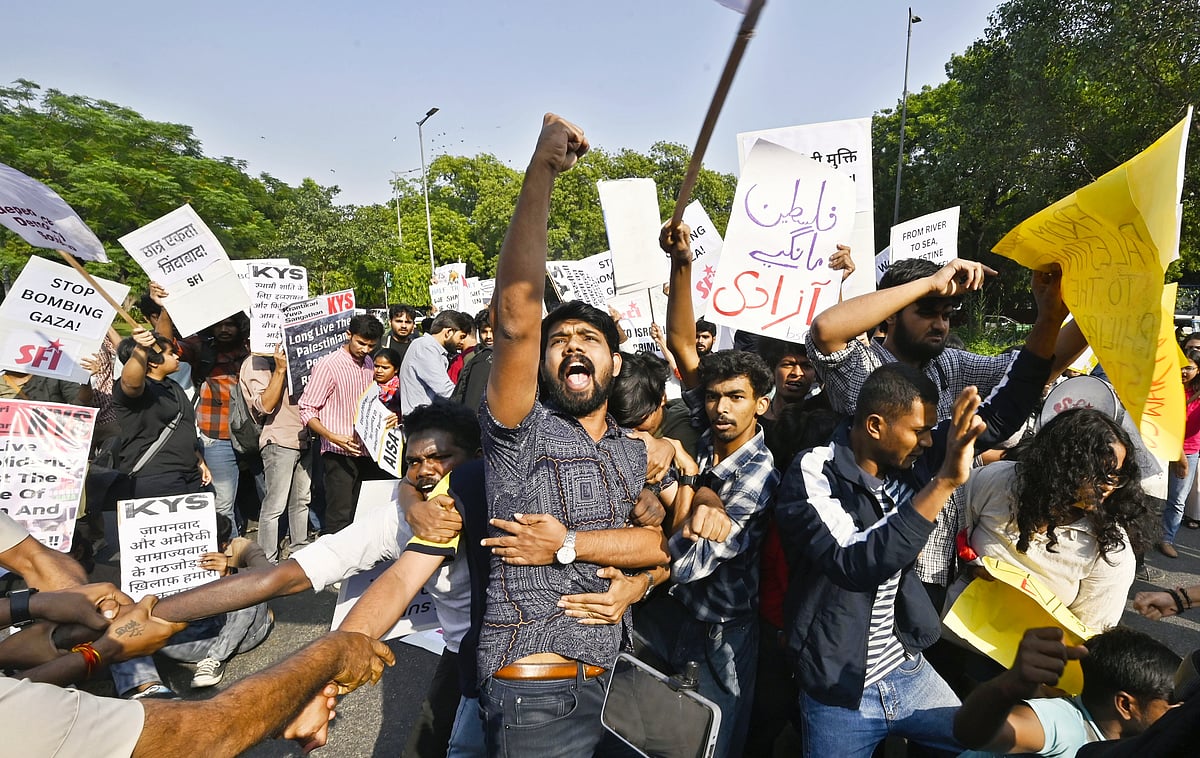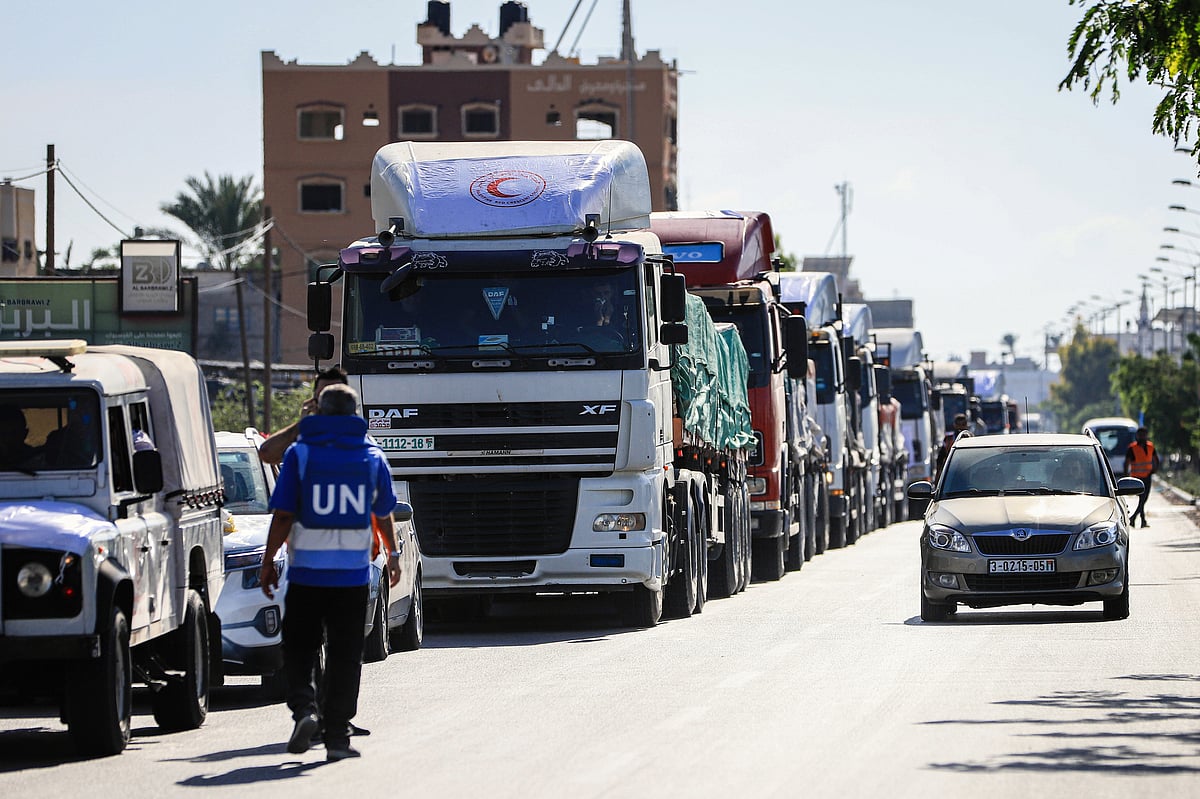Israel rejects UN and global community's plea for immediate ceasefire
"This is a time for war" says PM Benjamin Netanyahu, refusing ceasefire and likening the situation with US action after 9/11

Israeli Prime Minister Benjamin Netanyahu shocked the world on Monday, stating Israel would not agree to a ceasefire, saying "this is a time for war" and drawing parallels with the US military action after the 9/11 attacks of 2001 and Pearl Harbour attacks of 1941.
Israel ground forces pushed two miles into Hamas-occupied Gaza with an intent to crush the militant organisation holding some 232 hostages of various nationalities, according to reports reaching Washington from Tel Aviv.
Israel's military killed dozens of Hamas fighters Monday overnight, striking targets in northern Gaza as its expanded ground operations in the enclave moved rapidly. Israeli media showed the country's troops atop a hotel about two miles into the Gaza Strip, media reports said.
Netanyahu made it clear on Monday that Israel would not agree to a ceasefire. "I want to make clear Israel's position regarding the ceasefire. Just as the US would not agree to a ceasefire after the bombing of Pearl Harbour, or after the terrorist attacks of 9/11, Israel will not agree to a cessation of hostilities with Hamas after the horrific attacks of 7 October," he said.
"Calls for a ceasefire or calls for Israel to surrender to Hamas, to surrender to terrorists, surrender to barbarism, that will not happen," he said, adding, while the Bible says there is a time for peace, "This is a time for war."
Asked if he has considered stepping down, Netanyahu said the only thing he would resign is Hamas. "We're going to resign them to the dustbin of history. That's my goal. That's my responsibility," he added.
Netanyahu also rejected claims of civilian casualties in Gaza, pushing back against reports that Israel was inflicting collective punishment on the Palestinian people in its pursuit of Hamas, saying the group was preventing civilians from moving to the safe zone in southern Gaza.

"Hamas is preventing them from leaving, keeping them in areas of conflict. So I think you should direct your questions to Hamas," Netanyahu told a reporter at the news conference.
He added that Israel has been trying to prevent civilian casualties by calling for civilians in Gaza to move to a safe zone in the south and providing humanitarian support.
"We have to do everything we can to minimise civilian casualties, but we cannot give up the fight," he said, saying the future of his countries and other "civilised countries" depend on it.
Meanwhile, the United Nations warned that "civil order" was breaking down in Gaza after weeks of siege and bombardment, with people breaking into warehouses to grab essentials for their survival.
United States President Joe Biden pushed Netanyahu on Sunday to "immediately and significantly" scale up the flow of humanitarian aid into Gaza, the White House said.
Hamas has released a video showing three women who are believed to be captives held by the Palestinian militant group since its terror attack on Israel. The video comes just days after Israeli leaders dismissed talks of progress in hostage negotiations, CNN reporters from the battlefield in Gaza said.

The US is pushing Israel to "ensure that communication networks in Gaza remain operational," as well as to restore essential services of water and fuel, a state department spokesperson said.
"We made clear to the government of Israel over the weekend that communications networks need to be restored, and we are pleased that they took steps to do that," department spokesperson Matthew Miller said at a press briefing. Miller also said the US is "making progress" on ensuring fuel deliveries to Gaza.
A total of 150 aid trucks have made it through the Rafah crossing into Gaza since the gate opened last week, according to the state department. A total of 45 aid trucks went through on Sunday — the most since the gate opened, it added. "We aim to surpass that number today, tomorrow and beyond," said Miller.
Miller added the US would "continue our relentless diplomatic efforts in partnership with Israel, Egypt, the United Nations and international humanitarian partners" to increase "daily deliveries of food, water and medical supplies into Gaza".
Prior to 7 October, there were 450 trucks going into Gaza daily, said Lynn Hastings, the UN Humanitarian coordinator for the occupied Palestinian territory, in a press briefing last week. She added that trucks were facing delays owing to screening, technical, security and political issues.
New leaflets in Arabic dropped from Israeli aircraft on Gaza urged civilians to evacuate a "battlefield", warning people in northern and central parts of the strip that "the governorate of Gaza has become a battlefield".
"Shelters in the north of the Gaza Strip and the governorate of Gaza have become unsafe," according to the leaflet, an image of which CNN said it saw. "Hamas and the terrorist organisations are using the shelters, hospitals and schools in this area. Therefore, your presence in these places is not safe," the flier continued.
"You must immediately evacuate and move to the humanitarian area to the south of Wadi Gaza," the leaflet said.
Meanwhile, an Israeli soldier kidnapped by Hamas has been released, the Israeli Defence Forces said. The soldier, who was allegedly kidnapped by Hamas on 7 October, was released during ground operations in Gaza, the IDF said on Monday.
"Overnight, the soldier PVT Ori Megidish was released during IDF ground operations," the IDF said in a statement. "The soldier was medically checked, is doing well, and has met with her family."
Follow us on: Facebook, Twitter, Google News, Instagram
Join our official telegram channel (@nationalherald) and stay updated with the latest headlines